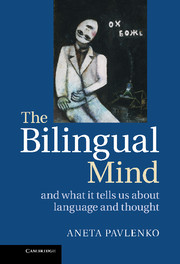Book contents
- Frontmatter
- Contents
- List of Tables
- Acknowledgments
- Preface
- 1 The Sapir-Whorf hypothesis and the bilingual turn in the study of language and cognition
- 2 Material worlds
- 3 Multidimensional worlds
- 4 Dynamic worlds
- 5 Narrative worlds
- 6 Discursive worlds
- 7 Emotional worlds
- 8 The bilingual mind and what it tells us about language and cognition
- References
- Author index
- Subject index
1 - The Sapir-Whorf hypothesis and the bilingual turn in the study of language and cognition
Published online by Cambridge University Press: 05 June 2014
- Frontmatter
- Contents
- List of Tables
- Acknowledgments
- Preface
- 1 The Sapir-Whorf hypothesis and the bilingual turn in the study of language and cognition
- 2 Material worlds
- 3 Multidimensional worlds
- 4 Dynamic worlds
- 5 Narrative worlds
- 6 Discursive worlds
- 7 Emotional worlds
- 8 The bilingual mind and what it tells us about language and cognition
- References
- Author index
- Subject index
Summary
In science … novelty emerges only with difficulty, manifested by resistance, against a background provided by expectation. Initially, only the anticipated and usual are experienced even under circumstances where anomaly is later to be observed. Further acquaintance, however, does result in awareness of something wrong or does relate the effect to something that has gone wrong before. That awareness of anomaly opens a period in which conceptual categories are adjusted until the initially anomalous has become the anticipated.
Kuhn, [1962] 2012: 64My approach to writing is also informed by my fascination with history, or rather with our ongoing dialog with the past, where we continuously ask new questions about where we have been and receive new answers that have a bearing on where we go next. The preference for the diachronic over the synchronic also informs this introductory chapter, whose aim is to examine why, until recently, bilingualism played no role in discussions of language and thought and to understand what brought about the change. Yet, despite my love of history, I am not a historian of science – readers interested in the history of ideas about language diversity and thought should consult Allan (2007), Joseph (2002), Koerner (2002), Lucy (1992a), and Leavitt (2011). My own goal is to draw on these and other sources to discuss two lesser-known aspects of the history of what we know as the Sapir-Whorf hypothesis (SWH). To explain what happened to Humboldt’s idea of second-language (L2) learning as a way to transcend the boundaries of the first language (L1), I will depart from the traditional preoccupation of English-language academia with its own history and compare the treatment of Humboldt’s ideas in the US with that in Western Europe, Russia and the USSR. Then I will consider the invention of the SWH tradition in the US and ask how likely is it that Humboldt, Sapir, and Whorf, all of them multilingual and fascinated by language learning and change, believed that language determines thought? And if they did not, who did?
- Type
- Chapter
- Information
- The Bilingual MindAnd What it Tells Us about Language and Thought, pp. 1 - 39Publisher: Cambridge University PressPrint publication year: 2014
- 1
- Cited by



